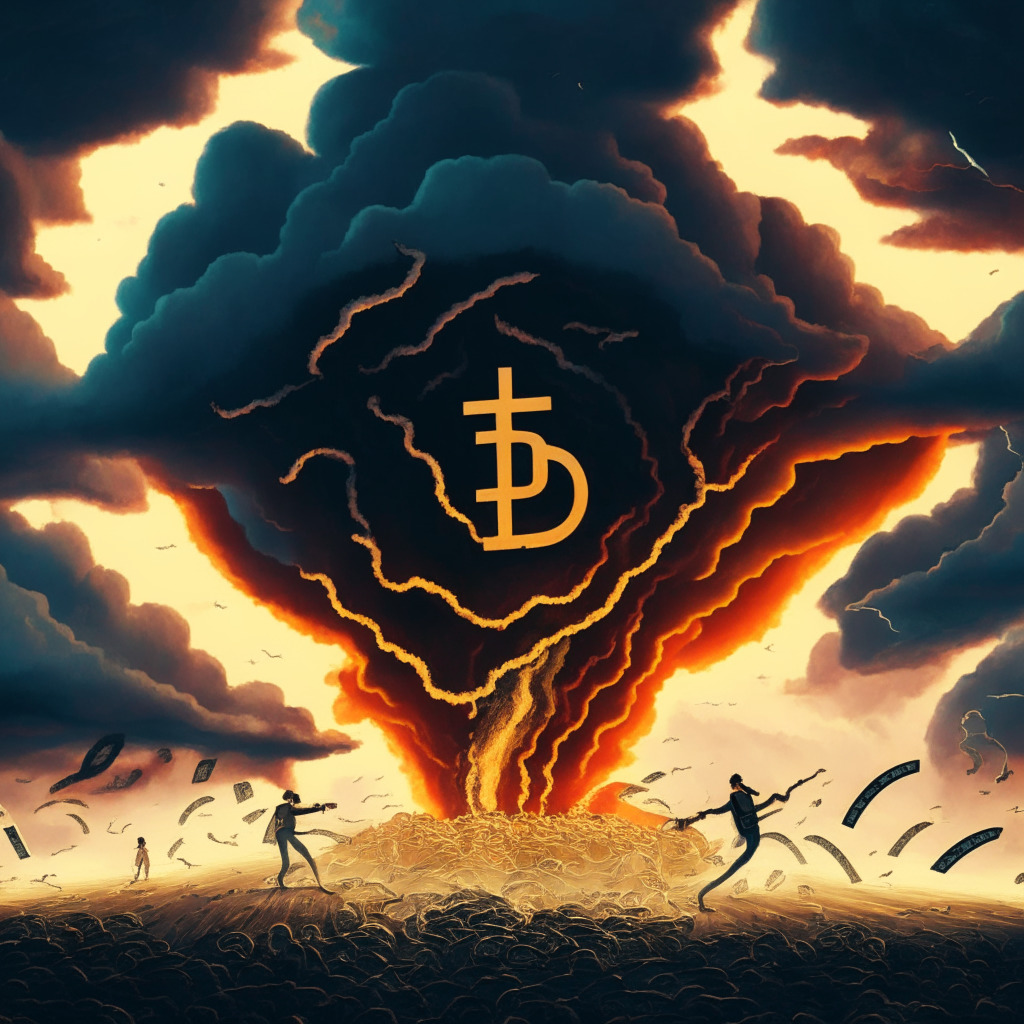The U.S. Treasury’s OFAC has imposed sanctions on Russian firms and individuals, including an Ethereum wallet, for assisting Russia in evading existing punitive measures amidst the Ukrainian conflict. The case underscores the dual nature of cryptocurrencies as convenient cross-border transaction tools and potential means for illicit activities, emphasizing the need for balancing their benefits with security safeguards.
Search Results for: U.S. Treasury
Impending US Debt Default: Impact, Uncertainty, and Urgent Bipartisan Efforts
U.S. Treasury Secretary Janet Yellen warns of a potential debt default by June 1, urging Congress to address the issue. A default could lead to severe economic hardships, damage global leadership, and impact national security. The May 9 bipartisan talks hold the key to understanding the urgency and potential repercussions, emphasizing the need for Congress to find a solution.
Navigating Economic Uncertainly: Bitcoin and Market Stability Amidst Rising Inflation
“U.S. economy experiences instability with personal consumption expenditure inflation index rising by 3.5%. U.S. Treasuries depreciated by $1.5 trillion due to recent rate hikes, raising investor concerns about assets like Bitcoin and trading market’s ability to weather rising interest rates.”
PayPal’s Integration with Crypto.com: Pioneer Move or Futile Endeavor?
The cryptocurrency exchange Crypto.com and financial powerhouse PayPal have partnered, with Crypto.com becoming an exchange of choice for PayPal’s stablecoin, PYUSD. By facilitating PYUSD trading pairs, Crypto.com aims to connect over 80 million users to new crypto innovations while supporting PayPal’s extensive network.
High Interest Rates and Bitcoin Performance: Unraveling Market Reactions and Divergence
“In the wake of Federal Reserve’s decision to maintain high interest rates, a divergence between the S&P 500 and Bitcoin has become apparent. This indicates that Bitcoin and other cryptocurrencies may march to their own drumbeat, influenced by factors like regulatory tweaks, attacks resilience and monetary policy predictability, potentially outperforming the S&P 500 in the future.”
Declining Dominance of Stablecoins: A Shift Towards Traditional Assets or a Chance for Recovery?
Despite a difficult year, the focus stays on the declining stablecoin sector, with major stablecoins like USDT showing consistent growth amidst the downturn. Factors such as legal action against major crypto exchanges and swings in stablecoin trading volumes due to the rush to list Bitcoin ETFs have impacted this fall. However, PayPal’s recent introduction of PYUSD could revive confidence in the sector. The future of stablecoins, while currently unstable, is still pivotal to the crypto landscape.
The Dwindling Dominance of Stablecoins: A Market Shift Towards Traditional Assets
Stablecoin market dominance has declined to 11.6%, despite a 10.9% rise in trading volume for such currencies. Despite challenges faced by cryptocurrencies, the launch of PayPal’s stablecoin PYUSD might revive investor faith in stablecoins, and encourage broader crypto adoption.
PayPal’s Entry into Stablecoin Could Disrupt Financial Markets: Quigley’s Forecast & Scrutiny
Tether co-founder William Quigley has noted that PayPal’s venture into stablecoin could revolutionize multicurrency transactions by reducing costs. However, whether PayPal will transfer these savings to end users or retain them as profit is yet to be seen.
Blending Traditional Finance with DeFi: MetaComp’s Bold Game-Changer in Singapore’s Financial Scene
“MetaComp, Singapore’s digital asset platform, combines traditional finance with decentralized finance, allowing customers to purchase traditional securities with stablecoins. Despite some skepticism due to crypto volatility, the firm believes that fiat-pegged cryptocurrencies will penetrate the real economy.”
Fed’s Potential $100B Loss and Its Impact: Turmoil or Triumph for Bitcoin?
Industry analyst Marcel Pechman discusses the challenges inflation presents to the Federal Reserve and the potential financial risks of their lenient monetary strategy. He suggests these issues may lead individuals to explore secure alternatives like Bitcoin and other blockchain technologies.
Unraveling Blockchain: Introducing Privacy Pools for Enhanced Security and Compliance
Vitalik Buterin and his co-authors introduced novel “privacy pools” in blockchain, addressing privacy issues and crime associated with privacy mixers. These pools utilize zero-knowledge technology to separate honest transactions from unlawful activities, encouraging transparency and honesty in this digitally decentralized environment. The future of blockchain looks promising yet challenging with regard to privacy and regulatory compliance.
Rollercoaster Predictions: Bitcoin’s Potential Rise to $22K Amidst Market Uncertainty
“Despite the gloomy market sentiment and legal hurdles from SEC, market analysts forecast Bitcoin could hit the $22K mark. U.S. inflation drop and Federal Reserve’s liquidity drainage could push investors to alternative assets like Bitcoin. However, serious challenges still remain.”
Death Cross in Bitcoin’s Path: A Forecast of Decline or A Misleading Index?
The impending Bitcoin death cross, a bearish signal indicating short-term price momentum drop, could signify a market decline, strongly influenced by the strengthening U.S. dollar and perilous macro developments. Interestingly, Bitcoin’s death cross historically, hasn’t consistently yielded negative returns, poking holes in expectations of a straightforward decline.
The Paradox of Rate Hikes: Federal Reserve Tactics, BitMEX Perspective and the Emergence of the AI-Crypto Ecosystem
In a keynote at Korea Blockchain Week, Arthur Hayes, the founder of BitMEX, argued that Federal Reserve’s tactics to combat inflation could inadvertently fuel economic growth. He also predicted the potential of AI companies and a significant asset bubble resulting from the convergence of AI, crypto, and money printing.
London Stock Exchange Paves Runway for Blockchain Integration, Sans Cryptocurrencies
The London Stock Exchange Group is preparing to integrate blockchain technology into its trading procedures for traditional financial assets. This follows a year of research into the feasibility of combining conventional markets with blockchain’s transparent infrastructure. However, the proposed system will exclude cryptocurrencies, focusing on using blockchain to increase efficiency.
Sanction Enforced: Binance Removes Banco de Venezuela from P2P Services
“In a move to enforce international financial sanctions, Binance, the world’s largest crypto exchange, has eliminated a payment method attached to Banco de Venezuela from its P2P trading service. This action reflects the limited room for maneuver that global crypto exchanges have amidst international sanctions and raises questions about the extent to which the promises of cryptocurrencies hold true in a regulated market.”
Tornado Cash Co-Founder Arrest and Debate on Developer Responsibility in Blockchain Regulation
Tornado Cash co-founder, Roman Storm, was arrested over money-laundering charges. The case has raised debates about responsibility and control within the blockchain industry, particularly for software developers. This controversy suggests that future blockchain regulation is navigating uncertain territory.
Integration of Real-World Assets and DeFi: The Future or a Paradox?
“Pendle Finance aims to integrate real-world assets within the digital finance ecosystem, opening access to traditional financial instruments. While this could attract large, off-chain institutional investors, it raises questions of blurring boundaries between decentralized finance and traditional systems.”
Tornado Cash Founders Charged: A Blow for Privacy or Triumph for Law Enforcement?
“Roman Storm and Roman Semenov, key figures of Tornado Cash, are facing charges for helping North Korea’s Lazarus Group launder over $1 billion via a privacy mixer. This incident sparks debate on blockchain privacy protections being exploited by criminals versus the potential shortfalls of legal jurisdiction in regulating such abuses.”
Maple Finance’s $5 Million Expansion into the Asian Crypto Market: Innovation or Risk?
“Maple Finance, a blockchain-based credit marketplace, has revealed plans to expand into the Asian market, supported by a $5 million investment from firms including BlockTower Capital and Tioga Capital. This move forms part of a growth strategy to extend its technology and create global alliances, primarily within Singapore, Japan, Hong Kong, and Korea.”
Future of Gold-Backed BRICS Currency: A Dream or Reality? Debating Pros, Cons, and Bitcoin Effect
“Macroeconomist Lyn Alden argues against the feasibility of a forthcoming gold-backed BRICS currency, citing it a tough challenge for BRICS members. Doubts are raised about the model backing a fractional-reserve banking system with gold.”
Upholding Sanctions on Crypto Mixer Tornado Cash: A Regulatory Triumph or Freedom Infringement?
“A federal judge in Texas validated sanctions on Tornado Cash, a crypto mixing service, dismissing concerns that the Treasury Department overstepped their jurisdiction. This significant precedent for regulatory authority over crypto services underscores the need to balance user anonymity with oversight for illicit activities.”
Crypto Crash: Analyzing the Recent Market Downturn & Its Relations with Global Economy
Cryptocurrencies recently experienced a shocking mid-afternoon dip, with altcoins like Ripple, Dogecoin, Polkadot, Polygon, and Uniswap losing over 4%. This downturn may be linked to strong U.S. retail sales data, which sparked fears of increased central bank tightening.
A Showdown at G20: Is Global Crypto Regulation the Answer or Another Problem?
“G20 leaders have emphasized the need for global coordination on crypto regulations. The IMF managing director likens crypto to water, stating that it always finds its way out. Amidst heated discussions, India pushes for a globally coordinated approach, despite internal resistance and the country’s unique crypto issues.”
Navigating SEC Exemptions in Blockchain: A Deeper Dive into Maple Finance’s Achievement and DeFi Risks
This article explores the landscape of blockchain regulations, focusing on Maple Finance’s recent exemption from SEC regulations. It highlights the growth of the DeFi sector, constant market opportunities, network vulnerabilities and the importance of security and regulatory compliance. The piece also discusses the qualification for individual investors in the U.S.
PayPal’s Stablecoin Revolution: Evolving Crypto Landscape with Regulatory Safeguards
PayPal launches its own stablecoin, PYUSD, representing a pioneering move in bringing regulatory oversight and customer asset protection to the crypto world. The coin, developed with Paxos, is closely monitored by the New York Department of Financial Services to secure it against bankruptcy risks.
Fed’s Aggressive Interest Cycle Closure: Impact on Crypto Market and Future Predictions
“While investment banks predict that the aggressive interest rate cycle initiated by the U.S. Federal Reserve may draw to a close, this doesn’t necessarily mean a return of the 2020-21 bull market. Regulatory intervention, rising borrowing costs, tightened credit standards and other economic factors complicate forecasts. However, as inflation is expected to stay on target, a halt to further rate hikes seems plausible.”
Tether’s Billion-Dollar Quarterly Profits: Financial Health or Cause for Concern?
“Tether’s self-reported asset value of over $86 billion surpasses the market cap of its USDT stablecoin. While the brand boasts a $1 billion profit, skepticism arose from its financial history and reduced cash holdings, opening conversations about the need for a full-fledged audit.”
Navigating the Crypto Rollercoaster: Market Volatility Amidst Major Altcoin Dips and Bitcoin’s Recovery
“The crypto markets recently have been nothing short of a roller coaster ride. Major altcoins and Bitcoin experienced dips and recoveries amidst industry-specific and macro events, contributing to significant market volatility. The anticipation of major events like Blackrock’s spot ETF ruling and Bitcoin halving suggests continued market turbulence.”
US Defense Bill’s Impact on Stablecoins: A Compliance Conundrum in the Offing
The U.S. national defense bill could pose compliance challenges for stablecoins like USDC due to proposed Know Your Customer (KYC) and anti-money laundering (AML) measures. The standards may affect stablecoin holders’ identities and impact USDC’s market cap. The bill’s implications could also affect Coinbase, which derived almost 27% of its net revenue from USDC in Q1 2021.
2024 NDAA and Crypto: Striking Balance between Oversight and Innovation
The United States Senate has passed the 2024 National Defense Authorization Act that targets crypto mixers, crypto trading institutions, and anonymous coins. The bill draws provisions from the Digital Asset Anti-Money Laundering Act and the Responsible Financial Innovation Act for improved oversight on crypto-based activities. Key measures include examination standards for crypto, preventing FTX-style events, and studies to curb anonymous crypto transactions.
Blockchain’s Role in Securing the AI-Driven Future: An Essential Counteraction to AI Threats
“AI’s potential benefits come with risks, such as new attack avenues for cybercriminals. Blockchain technology could counter these security threats introduced by AI. Its immutable, decentralized storage combats unauthorized modifications or tampering with datasets that define AI models, assuring data integrity and preventing unauthorized AI utilization.”































